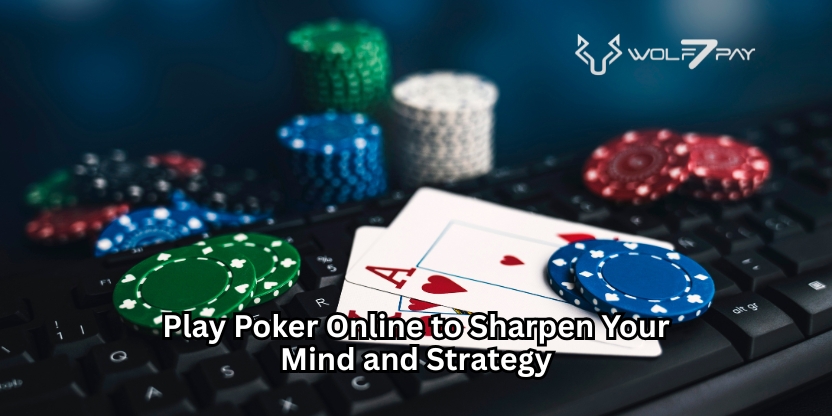Poker has never been a game of luck. It’s a game of skill, instinct, and calculated decision. Most games of pure luck simply don’t demand the same level of mental stimulation that poker does. With the growth of online gaming, the game is more accessible than ever before, giving players the perfect opportunity to test their minds, hone their strategy, and hone their mind game—all from the comfort of their own home.
Whether you are an absolute beginner or a casual player, poker can be a great deal more than just fun and games. Poker may be a way of sharpening your memory, concentration, and analytical faculties. The game demands discipline, patience, and an understanding of probabilities, all of which sharpen the mind and also facilitate day-to-day decision-making.
The Power of Poker on the Brain
Many researches and affidavits of players confirm the idea that poker has a positive impact on cognitive activity. Analytical games such as poker test brain areas that deal with memory storage, calculation, emotions, and reason.
Whenever you engage in playing poker, you must observe the cards that have already been played, read your opponents’ actions, manage your bankroll, and make pressured choices. All these psychological activities continuously reinforce neural connections and promote brain health.
Poker also demands making predictions based on incomplete data. Such a process perfectly mimics real-life decision-making, such as evaluating business risks, planning investments, or even managing social interactions.
Patience and Discipline in Practice
A key part of poker is waiting. Waiting for the proper time, that is. Being impatient creates wasteful losses. Rehearsing when to fold, when to call, and when to bet all at once habituates players to be cool heads and stick to their plan. These attributes come in handy far beyond the virtual table.
Poker also teaches the management of emotions. A player cannot afford to tilt or lose his cool when he gets a bad beat. Remaining calm and adapting to changes in luck makes one emotionally resilient—a valuable life skill.
Reading Opponents and Building Instincts
Though you’re not facing one another in online gaming, poker still demands reading the fineries. Tone of voice and body language enter into play when playing live. Online poker instead uses bet size, timing, and patterns to define the strength or weakness of an opponent.
This form of analysis develops your intuition. You learn to rely not only on logic and mathematics but also on instinct gained through experience and observation. This combination of logic and intuition enables players to be more perceptive thinkers and decision makers in the long term.
Mathematical Thinking and Analytical Skills
Poker is essentially a mathematical game. Be it pot odds or implied odds, every decision requires quick mathematical calculations. This fosters analytical thinking, which can be applied in areas such as finance, engineering, and analysis of data.
The more you play, the more your mind internalizes probabilities. Before long, it becomes second nature to calculate your chances. With this enhanced sense of numbers, you can make better, better-informed decisions in life.
The Importance of Long-Term Planning and Strategy
Short-term luck may play its part, but long-term success at poker is all about strategy. Possessing a good game plan, adjusting as needed to fit different players, and knowing when to make risk-based decisions are the main factors in becoming an excellent player.
In the middle of your journey, you’ll begin to understand how vital it is to play Poker online consistently to test and refine your strategy. Online games offer various formats—cash games, tournaments, Sit & Go’s—that allow players to practice different approaches and learn from experience. This exposure deepens strategic thinking and boosts long-term planning abilities, both in poker and beyond.
Poker as a Tool for Personal Growth
Besides making the mind sharper, poker also helps improve people. It teaches responsibility, especially when it comes to a bankroll or losses. It gives self-assurance as people start to see their improvement and gain experience from their failure.
Each session brings new problems and new lessons. Players soon learn to have the attitude of continuous improvement—a mindset that translates to success in many personal and professional fields.
Building Focus and Reducing Distractions
Poker demands focus in an age where attention spans are shorter than they have ever been. Multi-table online games, particularly, necessitate maintaining a high level of concentration. Distractibility can result in immediate penalty in the form of bad choices or missed opportunities.
Building concentration by brain training under high-pressure conditions improves mental resilience. Over time, this skill for concentration increases productivity and efficiency in other areas of life—like studying, work, or artistic pursuits.
Practicing Mindfulness Using Poker
Surprisingly enough, poker actually promotes awareness. Being “in the moment” while playing a hand, reading the game situation, and controlling emotions requires a lot of awareness. You must continually monitor your state of mind so you’re making rational decisions, not emotional ones.
It is this conscious state that is similar to mindfulness meditation—only in a more active, competitive manner. It makes you examine your thoughts and intentions, creating a pattern of self-consciousness and regulation that works in your mental well-being.
Final Thoughts
Poker is a hobby, but only to a point. It’s an informative, participatory form of mental honing and self-improvement. From game strategy and numerical reason to emotional regulation and mental focus, poker is an all-around mental workout.
Therefore, if you’re looking for an engaging way to build mental sharpness, create discipline, and enjoy an exciting challenge, poker might just be your best friend.
